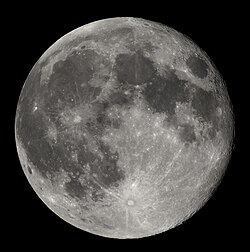Mond
Alemannic German
[edit]Alternative forms
[edit]Etymology
[edit]From Old High German māno, from Proto-Germanic *mēnô. Cognate with German Mond, English moon, Icelandic máni, Gothic 𐌼𐌴𐌽𐌰 (mēna).
Noun
[edit]Mond m
Central Franconian
[edit]Alternative forms
[edit]- Muund (rare variant in Moselle Franconian)
Etymology
[edit]From a conflation of Old High German māno (from Proto-Germanic *mēnô) and mānōd (from Proto-Germanic *mēnōþs), both from Proto-Indo-European *mḗh₁n̥s.
Pronunciation
[edit]Noun
[edit]Mond m (plural Mond or Monde)
- (most dialects) moon
- Wa’ mer naachs em Bösch es, süht mer, wie hell der Mond schengk.
- When you’re in the forest at night, you see how bright the moon shines.
- (most dialects) month
- Ich hann ald drei Mond nur der halve Luhn jekräje.
- I’ve been paid just half my salary for three months now.
German
[edit]

Etymology
[edit]From Middle High German māne, from Old High German māno, from Proto-West Germanic *mānō. Later forms of the Middle High German word, mānde, had a final dental due to confusion with mānōt (“month”) (modern Monat).
See also Dutch maan, English moon, Swedish måne, Icelandic máni; also Monat.
Further Indo-European cognates: Latin mēnsis (“month”), Ancient Greek μήν (mḗn, “month”), Sanskrit मास (māsa, “moon”), Russian месяц (mesjac, “moon; month”), Lithuanian mėnulis, Persian ماه (mâh, “moon, month”), Tocharian A mañ
Pronunciation
[edit]Proper noun
[edit]der Mond m (proper noun, strong, usually definite, definite genitive des Mondes or des Monds)
- (astronomy) the Moon; Earth's only natural satellite, and also a luminary
- Der Mond ist so massereich, dass Erde und Mond zusammen häufig als Doppelplanet bezeichnet werden.
- The Moon has such an enormous mass that Earth and Moon are often considered as a binary system.
Declension
[edit]Noun
[edit]Mond m (strong, genitive Mondes or Monds, plural Monde)
- (astronomy) moon (a natural satellite that is orbiting its corresponding planet)
- Ganymed ist der größte Mond des Sonnensystems.
- Ganymede is the biggest moon of the Solar System.
- Merkur und Venus haben keine natürlichen Monde.
- Mercury and Venus do not possess natural moons.
- (literary, dated) a month, especially a lunar month
- (heraldry) moon (often used to describe a crescent)
Declension
[edit]Old Declension: This old declension is not used anymore, but was up until the end of the 18th century.
Synonyms
[edit]Hypernyms
[edit]Hyponyms
[edit]Derived terms
[edit]Related terms
[edit]See also
[edit]Further reading
[edit]- “Mond” in Digitales Wörterbuch der deutschen Sprache
- “Mond” in Uni Leipzig: Wortschatz-Lexikon
- “Mond” in Duden online
 Mond on the German Wikipedia.Wikipedia de
Mond on the German Wikipedia.Wikipedia de
Hunsrik
[edit]Alternative forms
[edit]- moont (Wiesemann spelling)
Etymology
[edit]Inherited from Central Franconian Mond.[1]
Pronunciation
[edit]Noun
[edit]Mond m (plural Mone)
Related terms
[edit]References
[edit]- ^ Piter Kehoma Boll (2021) “Mond”, in Dicionário Hunsriqueano Riograndense–Português (in Portuguese), 3rd edition, Ivoti: Riograndenser Hunsrickisch, page 113, column 2
Luxembourgish
[edit]Etymology
[edit]From Old High German mund.
Pronunciation
[edit]Noun
[edit]Mond m (plural Mënner)
- Alemannic German terms inherited from Old High German
- Alemannic German terms derived from Old High German
- Alemannic German terms inherited from Proto-Germanic
- Alemannic German terms derived from Proto-Germanic
- Alemannic German lemmas
- Alemannic German nouns
- Alemannic German masculine nouns
- gsw:Astronomy
- gsw:Light sources
- Central Franconian terms inherited from Proto-Germanic
- Central Franconian terms derived from the Proto-Indo-European root *meh₁-
- Central Franconian terms derived from Proto-Indo-European
- Central Franconian terms inherited from Proto-Indo-European
- Central Franconian terms inherited from Proto-West Germanic
- Central Franconian terms derived from Old High German
- Central Franconian terms derived from Proto-West Germanic
- Central Franconian terms derived from Proto-Germanic
- Central Franconian terms inherited from Old High German
- Central Franconian terms with IPA pronunciation
- Central Franconian lemmas
- Central Franconian nouns
- Central Franconian masculine nouns
- Central Franconian terms with usage examples
- German terms derived from Proto-Germanic
- German terms inherited from Proto-Germanic
- German terms inherited from Middle High German
- German terms derived from Middle High German
- German terms inherited from Old High German
- German terms derived from Old High German
- German terms inherited from Proto-West Germanic
- German terms derived from Proto-West Germanic
- German 1-syllable words
- German terms with IPA pronunciation
- German terms with audio pronunciation
- German lemmas
- German proper nouns
- German masculine nouns
- de:Astronomy
- German terms with usage examples
- German uncountable nouns
- German nouns
- German literary terms
- German dated terms
- de:Heraldic charges
- German weak nouns
- Hunsrik terms inherited from Old High German
- Hunsrik terms derived from Proto-Indo-European
- Hunsrik terms derived from Old High German
- Hunsrik terms derived from Central Franconian
- Hunsrik terms derived from Proto-Germanic
- Hunsrik terms inherited from Proto-Indo-European
- Hunsrik terms derived from the Proto-Indo-European root *meh₁-
- Hunsrik terms inherited from Proto-Germanic
- Hunsrik terms inherited from Proto-West Germanic
- Hunsrik terms derived from Proto-West Germanic
- Hunsrik terms inherited from Central Franconian
- Hunsrik 1-syllable words
- Hunsrik terms with IPA pronunciation
- Rhymes:Hunsrik/oːnt
- Rhymes:Hunsrik/oːnt/1 syllable
- Hunsrik lemmas
- Hunsrik nouns
- Hunsrik masculine nouns
- hrx:Moon
- Luxembourgish terms derived from Proto-West Germanic
- Luxembourgish terms inherited from Proto-West Germanic
- Luxembourgish terms derived from Proto-Germanic
- Luxembourgish terms inherited from Proto-Germanic
- Luxembourgish terms inherited from Old High German
- Luxembourgish terms derived from Old High German
- Luxembourgish 1-syllable words
- Luxembourgish terms with IPA pronunciation
- Luxembourgish lemmas
- Luxembourgish nouns
- Luxembourgish masculine nouns
- lb:Face
